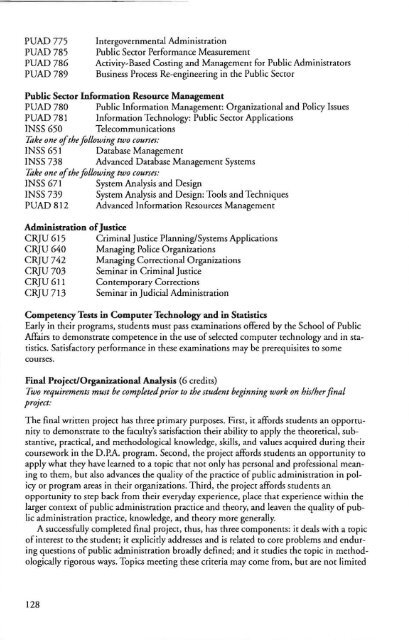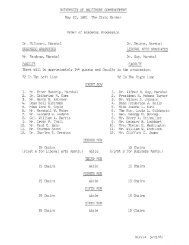2003-2005 - Special Collections - University of Baltimore
2003-2005 - Special Collections - University of Baltimore
2003-2005 - Special Collections - University of Baltimore
You also want an ePaper? Increase the reach of your titles
YUMPU automatically turns print PDFs into web optimized ePapers that Google loves.
PUAD775 Intergovernmental Administration<br />
PUAD785 Public Sector Performance Measurement<br />
PUAD786 Activity-Based Costing and Management for Public Administrators<br />
PUAD789 Business Process Re-engineering in the Public Secror<br />
Public Sector Information Resource Management<br />
PUAD 780 Public Information Management: Organizational and Policy Issues<br />
PUAD 781 Information Technology: Public Sector Applications<br />
INSS 650 Telecommunications<br />
Take one <strong>of</strong>the following two courses:<br />
INSS 651 Database Management<br />
INSS 738 Advanced Database Management Systems<br />
Take one <strong>of</strong>the following two courses:<br />
INSS 671 System Analysis and Design<br />
INSS 739 System Analysis and Design: Tools and Techniques<br />
PUAD 812 Advanced Information Resources Management<br />
Administration <strong>of</strong>Justice<br />
CRjU 615 Criminal Justice Planning/Systems Applications<br />
CRjU 640 Managing Police Organizations<br />
CRjU 742 Managing Correctional Organizations<br />
CRjU 703 Seminar in Criminal Justice<br />
CRjU 611 Contemporary Corrections<br />
CRjU 713 Seminar in Judicial Administration<br />
Competency Tests in Computer Technology and in Statistics<br />
Early in their programs, students must pass examinations <strong>of</strong>fered by the School <strong>of</strong> Public<br />
Affairs to demonstrate competence in the use <strong>of</strong> selected computer technology and in statistics.<br />
Satisfactory performance in these examinations may be prerequisites ro some<br />
courses.<br />
Final Project/Organizational Analysis (6 credits)<br />
Two requirements must be completed prior to the student beginning work on his/her findl<br />
project:<br />
The final written project has three primary purposes. First, it affords students an opportunity<br />
to demonstrate to the faculty's satisfaction their ability to apply the theoretical, substantive,<br />
practical, and methodological knowledge, skills, and values acquired during their<br />
coursework in the D.P.A. program. Second, the project affords students an opportunity to<br />
apply what they have learned to a topic that not only has personal and pr<strong>of</strong>essional meaning<br />
to them, but also advances the quality <strong>of</strong> the practice <strong>of</strong> public administration in policy<br />
or program areas in their organizations. Third, the project affords students an<br />
opportunity to step back from their everyday experience, place that experience within the<br />
larger context <strong>of</strong> public administration practice and theory, and leaven the quality <strong>of</strong> public<br />
administration practice, knowledge, and theory more generally.<br />
A successfully completed final project, thus, has three components: it deals with a topic<br />
<strong>of</strong> interest to the student; it explicitly addresses and is related to core problems and enduring<br />
questions <strong>of</strong> public administration broadly defined; and it studies the topic in methodologically<br />
rigorous ways. Topics meeting these criteria may come from, but are not limited<br />
128
















